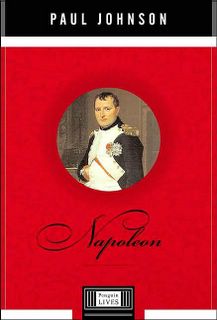
Here's a book club selection: Napoleon from the "Penguin Lives" series, written by Paul Johnson. The author claims that only Jesus Christ has had more books written about him than Napoleon Bonaparte. So why write another? A big reason is that they sell, I suppose.
Don't you hate it when an author refuses to take a stand on an issue? For example, he may try to present both sides, and leave it to the reader to make up his own mind. If you do, you're in luck. Johnson is not afraid to express an opinion, and his opinion is very Anti-Napoleon. A few of Johnson's views are as follows:
- Napoleon was an opportunist who had no guiding principles besides the growth of his own power, which directly resulted in the deaths of millions of people.
- By constructing the world's first totalitarian state, utilizing a secret police, propaganda, faked plebiscites, and so on, his was the model of the totalitarian states of the 20th century, such as Stalin's U.S.S.R.
- He awakened a sense of German nationalism, resulting in the creation of the Second, and thus, the Third Reich.
- For more than a century before Bonaparte's time, France was the largest and most powerful nation in Europe. One of Napoleon's legacies is the relative decline of France, from which it hasn't recovered.
- Johnson also points out that the United States of America was a lasting beneficiary of Napoleon's short-sightedness. By the sale of Louisiana to the US for what was then considered a very low price, he paved the way towards making America a world power. Frankly, I have a hard time envisioning a large, lasting French-speaking power in what is today the Central US. But if anyone could make it happen, it would be Nappy.
People who aren't history buffs will likely be bored, and the book did have a few annoying aspects. For example, it seems that a working knowledge of French is assumed, as Johnson will quote sentences such as, "Non, assurément, c'est un jeune homme trop bien elévé pour cela," without a translation. Johnson also showed off his knowledge of the English language. As an example, one word I learned was Sangfroid. I'll give it a relucant three stars out of five. I'd give it a lower rating, but I can't suggest a better book on the subject, and the book is memorable at least by the author's opinion of the subject matter.
1 comment:
Great post Dave. You really are churning through the books nowdays. I always find it difficult to understand how writers and researchers can work up their levels of digust, certainty and bile about characters that are long gone, and whose histories have been told by their conconquerers. Unfortunately strong opinionated authors are the ones who get published nowdays - or is that because all the moderate things to say have been claimed by all the previous writers?
Post a Comment